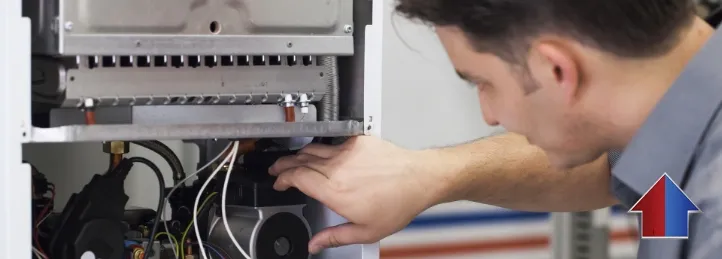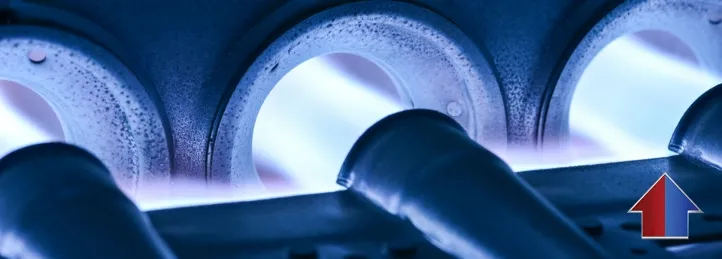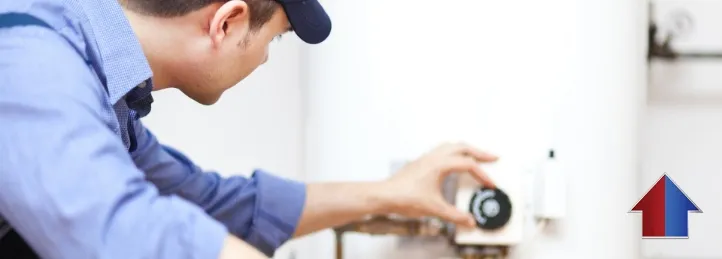Heating in Pittsburgh, PA

When the temperatures drop in Pittsburgh, you need a heating system you can depend on. At Boehmer Heating & Cooling, we’ve been helping local homeowners stay warm and safe for generations with expert furnace and heat pump services. From new installations to emergency repairs, our team is dedicated to delivering lasting comfort and energy efficiency for every home we serve.
- Over 90 Years in Business
- NATE-Certified Technicians
- 24-Hour Service
With a proven track record and a commitment to customer care, we ensure your heating system operates at peak performance all season long. Whether it’s restoring heat quickly on the coldest night or improving efficiency to lower utility bills, Boehmer Heating & Cooling is Pittsburgh’s trusted partner for dependable heating solutions tailored to your home and family.
Contact the Boehmer Heating & Cooling team today. Over 90 years of putting you first!

What Type of Heating System Do You Need?
Choosing the right heating system for your Pittsburgh home is an important decision that affects your comfort, energy efficiency, and long-term savings. With nearly a century of experience, Boehmer Heating & Cooling helps homeowners find solutions tailored to their needs, whether they’re replacing outdated equipment or installing a system in a new home.
Furnaces
Furnaces remain one of the most popular heating options thanks to their ability to quickly deliver warm air throughout the home. Available in both gas and electric models, furnaces can be highly efficient when properly maintained. A modern, high-efficiency furnace can dramatically lower utility bills while keeping your family comfortable during the coldest months.
Boilers
Boilers are another dependable option, especially in homes with radiant or baseboard heating. Instead of forced air, boilers use heated water or steam to provide steady, even warmth. Many Pittsburgh homeowners appreciate the quiet operation and consistent comfort that boilers deliver. Regular maintenance from a professional ensures safe operation and optimal performance.
Heat Pumps
For a versatile, energy-saving option, consider a heat pump. These systems provide both heating and cooling by transferring heat rather than generating it, making them highly efficient year-round. Advances in technology have made heat pumps more effective in colder climates, offering reliable comfort even during Pittsburgh winters.
Factors to Consider
When choosing a heating system, it’s best to weigh your household’s specific needs:
- Fuel source availability – gas, electric, or alternative energy options
- Home size and layout – larger homes may benefit from different solutions than smaller ones
- Energy efficiency goals – lower utility bills and reduced environmental impact
- Comfort preferences – steady radiant heat vs. fast warm air delivery
The professionals at Boehmer Heating & Cooling specialize in matching the right system to your home, ensuring comfort, safety, and energy savings. With our whole-house approach, we look beyond just the unit itself and consider ductwork, insulation, and indoor air quality for the best possible results.
Contact Boehmer Heating & Cooling today to find the perfect heating system for your Pittsburgh home.
How to Tell When It’s Time to Replace Your Heating System
Your heating system is one of the most important investments in your home, and knowing when it’s time for a replacement can save you from costly repairs, high utility bills, and unexpected breakdowns. At Boehmer Heating & Cooling, we help Pittsburgh homeowners make informed decisions about their comfort, offering expert guidance on when repair is enough and when replacement is the smarter choice.
Signs It May Be Time for a New System
If you’ve noticed any of the following issues, it may be worth considering replacement rather than continued repairs:
- Frequent repairs – If your furnace, boiler, or heat pump requires constant service, the costs can add up quickly.
- Rising utility bills – Older systems lose efficiency, forcing them to work harder and use more energy.
- Uneven heating – Cold spots throughout the home may indicate your system is struggling to distribute heat effectively.
- Excessive noise – Unusual banging, rattling, or humming sounds can signal significant wear or internal problems.
- Age of the system – Most furnaces and boilers last 15–20 years, while heat pumps average 10–15 years. Beyond this range, performance and efficiency decline.
Benefits of Replacing Your Heating System
Upgrading to a modern system offers more than just reliability. Pittsburgh homeowners can also enjoy:
- Improved comfort with even heating throughout the home
- Lower monthly energy costs thanks to higher efficiency ratings
- Enhanced indoor air quality with updated equipment and filtration options
- Peace of mind with manufacturer warranties and dependable performance
Professional Guidance You Can Trust
Choosing the right time to replace your heating system doesn’t have to be stressful. The experts at Boehmer Heating & Cooling evaluate your current unit, discuss your comfort goals, and provide options that fit your budget. Whether you need a high-efficiency furnace, a dependable boiler, or a versatile heat pump, we’ll ensure your new system is properly sized and expertly installed for maximum performance.
Call Boehmer Heating & Cooling today to schedule an evaluation and discover if it’s time to replace your heating system.
Warning Signs of a Malfunctioning Heating System
When Pittsburgh winters arrive, the last thing you want is a heating system that isn’t performing as it should. Recognizing the early warning signs of a malfunctioning furnace, boiler, or heat pump can help you avoid costly repairs and keep your home safe and comfortable. At Boehmer Heating & Cooling, we want homeowners to know what to look for so they can take action before small issues become major problems.
Common Red Flags to Watch For
Pay attention to these signs that your heating system may be in trouble:
- Uneven heating – Cold spots or inconsistent warmth often point to circulation or efficiency issues.
- Unusual noises – Banging, squealing, or rattling sounds are often caused by loose or failing components.
- Strange odors – Musty smells could signal mold in ductwork, while burning or gas odors require immediate attention.
- Short cycling – If your system constantly turns on and off, it may be overheating or improperly sized.
- Rising energy bills – A sudden increase in utility costs is often linked to reduced efficiency.
Safety Concerns
Some heating issues aren’t just inconvenient—they can be dangerous. A cracked heat exchanger in a furnace or a faulty boiler could release carbon monoxide, an odorless and potentially deadly gas. That’s why regular professional inspections and prompt attention to warning signs are critical for protecting your family’s health and safety.
Why Prompt Service Matters
Ignoring heating system problems can shorten the lifespan of your equipment and increase repair costs. Quick action from a trusted professional ensures your system is restored to peak efficiency, helping you save money and avoid breakdowns during the coldest days of the year.
At Boehmer Heating & Cooling, our NATE-certified technicians diagnose issues quickly and provide reliable solutions tailored to your system. Whether you rely on a furnace, boiler, or heat pump, we’re committed to restoring your comfort and peace of mind.
Contact Boehmer Heating & Cooling today if you’ve noticed any warning signs that your heating system may be malfunctioning.
Regular Heating Maintenance: It’s Important!
Your heating system works hard every winter to keep your Pittsburgh home comfortable, and like any major appliance, it needs regular care to perform at its best. Annual maintenance not only extends the life of your furnace, boiler, or heat pump but also ensures safer operation and improved energy efficiency. With help from the experts at Boehmer Heating & Cooling, you can avoid unexpected breakdowns and enjoy peace of mind all season long.
Why Maintenance Matters
Regular maintenance helps identify and correct small issues before they turn into costly repairs. Benefits include:
- Improved efficiency that lowers monthly utility bills
- Reliable performance during Pittsburgh’s coldest days
- Longer system lifespan, protecting your investment
- Safer operation, reducing risks like gas leaks or carbon monoxide exposure
Our Maintenance Plan
We make it easy to protect your comfort with a comprehensive maintenance plan designed to deliver year-round benefits:
- Two annual performance tune-ups—one for heating, one for cooling
- Free 24-hour priority service, with a technician at your door within 24 hours of your call
- 15% off repairs and reduced diagnostic fees, saving you money on service
- One-year labor warranty, so you’re covered if issues arise
For as little as $25 per month, our plan gives you the confidence that your HVAC system is cared for by NATE-certified professionals who understand how to keep it running at peak performance.
Protect Your Comfort Year-Round
Scheduling regular heating maintenance is one of the smartest steps you can take to ensure dependable warmth and lower energy costs. With our trusted maintenance plan, Boehmer Heating & Cooling helps Pittsburgh homeowners save money, extend equipment life, and avoid unpleasant surprises when winter hits.
Call Boehmer Heating & Cooling today to schedule your heating maintenance and learn more about our money-saving maintenance plan.

Only Trust Professionals for Your Heating Services
Your heating system is one of the most important parts of your home, especially during Pittsburgh’s long winters. While it might be tempting to attempt a DIY fix or hire an unqualified handyman, heating equipment like furnaces, boilers, and heat pumps require the skill of trained professionals. At Boehmer Heating & Cooling, we want homeowners to understand why professional service is the only safe and cost-effective choice.
Safety Comes First
Heating systems use gas, electricity, or combustion processes that, if handled incorrectly, can put your family at risk. From gas leaks to carbon monoxide exposure, the dangers of improper service are real. Professional technicians are trained to spot potential hazards and ensure your equipment runs safely.
Protecting Efficiency and Performance
Professional care doesn’t just fix problems—it helps prevent them. When you choose certified technicians, you can count on:
- Accurate diagnostics that get to the root of the problem
- Repairs done right the first time, avoiding repeat issues
- Improved efficiency, lowering energy bills and reducing wear
- Expert system sizing and installation, ensuring long-term performance
Safeguarding Your Warranty and Investment
Most manufacturers require professional installation and service to keep warranties valid. Skipping this step can void coverage and leave you responsible for costly repairs or replacements. With a professional like Boehmer Heating & Cooling, you gain peace of mind knowing your system is protected by both the manufacturer and our own labor warranties.
Why Choose Us
Not all contractors are created equal. Boehmer Heating & Cooling has been a trusted name in Pittsburgh heating since 1933, combining decades of experience with modern expertise. As a family-owned company for three generations, we understand the importance of dependable, personalized service. Our NATE-certified technicians bring advanced training to every project, meaning fewer callbacks, greater efficiency, and longer-lasting comfort.
We also specialize in a whole-house energy savings approach, which means we don’t just look at your heating system—we evaluate how your entire home works together. This helps us find ways to lower energy bills, improve indoor air quality, and keep your home healthier year-round. With 24-hour emergency service, transparent pricing, and a commitment to honesty, we’re the comfort specialists Pittsburgh families can always rely on.
Trust Boehmer Heating & Cooling for professional heating services that keep your Pittsburgh home safe, efficient, and comfortable.

